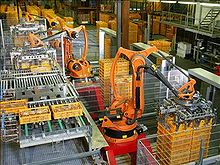- Food engineering
-
Food engineering is a multidisciplinary field of applied physical sciences which combines science, microbiology, and engineering education for food and related industries. Food engineering includes, but is not limited to, the application of agricultural engineering, mechanical engineering and chemical engineering principles to food materials. Food engineers provide the technological knowledge transfer essential to the cost-effective production and commercialization of food products and services.
Food engineering is a very wide field of activities. Prospective major employers for food engineers include companies involved in food processing, food machinery, packaging, ingredient manufacturing, instrumentation, and control. Firms that design and build food processing plants, consulting firms, government agencies, pharmaceutical companies, and health-care firms also hire food engineers. Among its domain of knowledge and action are:
- research and development of new foods, biological and pharmaceutical products
- development and operation of manufacturing, packaging and distributing systems for drug/food products
- design and installation of food/biological/pharmaceutical production processes
- design and operation of environmentally responsible waste treatment systems
- marketing and technical support for manufacturing plants.
Topics in food engineering
In the development of food engineering, one of the many challenges is to employ modern tools and knowledge, such as computational materials science and nanotechnology, to develop new products and processes. Simultaneously, improving quality, safety, and security remain critical issues in food engineering study. New packaging materials and techniques are being developed to provide more protection to foods, and novel preservation technologies are emerging. Additionally, process control and automation regularly appear among the top priorities identified in food engineering. Advanced monitoring and control systems are developed to facilitate automation and flexible food manufacturing. Furthermore, energy saving and minimization of environmental problems continue to be important food engineering issues, and significant progress is being made in waste management, efficient utilization of energy, and reduction of effluents and emissions in food production.
Typical topics include:
- Advances in classical unit operations in engineering applied to food manufacturing
- Progresses in the transport and storage of liquid and solid foods
- Developments in heating, chilling and freezing of foods
- Advanced mass transfer in foods
- New chemical and biochemical aspects of food engineering and the use of kinetic analysis
- New techniques in dehydration, thermal processing, non-thermal processing, extrusion, liquid food concentration, membrane processes and applications of membranes in food processing
- Shelf-life, electronic indicators in inventory management, and sustainable technologies in food processing
- Modern packaging, cleaning, and sanitation technologies
See also
- Cosmetics
- Pharmaceuticals
- Food Science
- Food Technology
- Aseptic Processing
- Dietary supplement
- Food fortification
- Food preservation
- Food rheology
- Food storage
- Food supplements
- Nutraceutical
- Nutrification (aka food enrichment or fortification)
- Food and Bioprocess Technology
- Food safety
- Food microbiology
- Food chemistry
- Food physical chemistry
- Food packaging
Template:MASTERS IN FOOD ENGINEERING
External links
- Ingeniería en Alimentos - Universidad Nacional de Luján
- Contemporary Food Engineering (CRC Press)
- International Academic Programs in Agricultural, Food,or Biological Engineering
- Contemporary Food Engineering (Taylor & Francis)
- Contemporary Food Engineering (Routledge)
- Food Engineering Magazine
- Food Engineering News from the IMechE
- Institute of Food Technologists Food Engineering Division website
- Introduction to Food Engineering (Academic Press)
- Erciyes University Department of Food Engineering
- METU Department of Food Engineering
- Ege University Department of Food Engineering
- Hacettepe University Department of Food Engineering
- Istanbul Technical University Department of Food Engineering
- Yeditepe University Department of Food Engineering
- Chamber of Food Engineers-Turkey
- Thermal food processing simulation and optimization software
Food science Allergy · Chemistry · Engineering · Law · Microbiology · Packaging · Processing · Quality · Foodservice (catering) · Technology · Nutrition (clinical) · Product development · Sensory analysis (discrimination testing) · Superfood
Categories:- Engineering disciplines
- Food science
- Food industry
Wikimedia Foundation. 2010.

